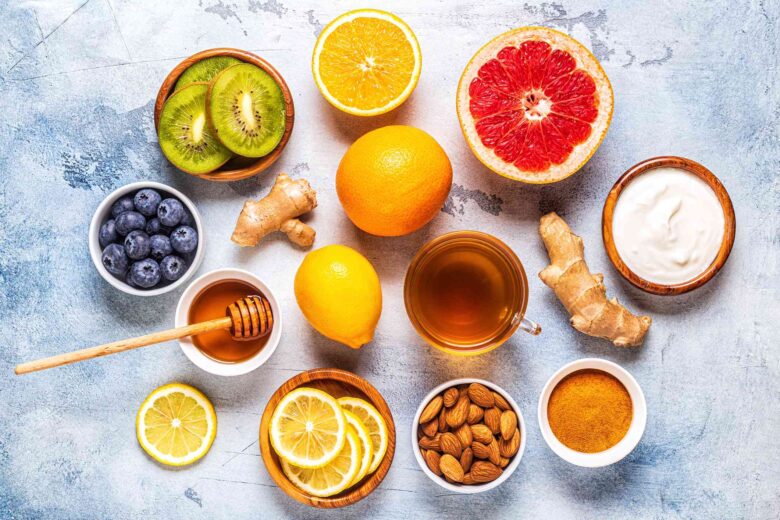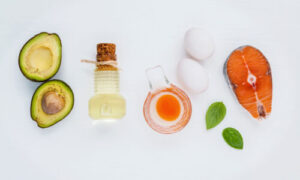The immune system protects the body from infections, diseases, and other harmful invaders. Nutrition is one of many factors that affect immune strength. Genetics and lifestyle also play a role. Your food provides your body with vitamins, minerals, and antioxidants that it needs to combat viruses and bacteria. The immune system will become weaker without proper nutrition. It is possible to maintain excellent health and strengthen your immune system by focusing on healthy foods and habits.
A Balanced Diet is Important for Immune Health
A balanced diet with all essential nutrients is key to a strong immune system. A balanced diet that includes proteins, carbohydrates, and healthy fats, as well as a variety of vitamins and minerals, will ensure the body is able to produce immune cells. Each nutrient has a specific role. Vitamins help support cellular functions, minerals boost defense mechanisms, and proteins are responsible for building the cells that fight infection. The immune system is weakened when the diet lacks any of these nutrients. Consistently selecting nutrient-dense foods is the key to a better immune system.
The Importance of Vitamins for Immunity
Some vitamins are particularly important for maintaining a healthy immune system. Vitamin C is found in citrus fruit, bell peppers, and strawberries. It boosts the production of white blood cells and acts as an antioxidant. Vitamin D is derived from foods such as fatty fish and fortified milk and sunlight. It helps to regulate the immune system and fight infections. Vitamin A is found in carrots and spinach. It helps to maintain the health of the skin and mucous tissues, which are the first line of defense for the body. These vitamins can be obtained naturally by eating whole foods, without having to take excessive supplements.
Minerals that Support Immune Function
Minerals such as iron, zinc, and selenium, along with vitamins, are essential for immune health. Zinc is found in lean meats and beans, nuts, and seeds. It helps to heal wounds and develop immune cells. Iron is found in leafy greens and legumes. It helps transport oxygen to the cells. This mineral is essential for energy and immune function. Selenium is found in Brazil nuts and eggs. It helps the body fight infection and reduce inflammation. These minerals are essential to a healthy immune system.
Antioxidants: Their Role in Protecting the Body
Antioxidants protect the body against damage caused by free radicals that can weaken your immune system with time. Antioxidants, found in foods such as dark chocolate, colorful vegetables, and green tea, protect against oxidative stresses. Antioxidants help to reduce inflammation by neutralizing harmful molecules. They also support the strength of the immune systems. Include a rainbow of fruit and vegetables in your meals. This is the easiest way to make sure you are getting enough antioxidants each day.
The Protein as the Building Block for Immunity
Protein is essential not only for muscle growth but also to build and repair the immune cells that protect the body. The immune system can’t produce antibodies to fight infection without enough protein. High-quality proteins are found in foods such as poultry and fish, beans, lentils, tofu, dairy, eggs, and soy. Include protein with every meal to ensure the body is able to support immune cell formation. Combining different plant proteins will provide a complete profile of amino acids to help strengthen immunity for those who follow a plant-based diet.
Gut Health and Probiotics
Gut health is important for overall immunity because a large part of the immune system is in the gut. Probiotics, or beneficial bacteria, help to maintain the balance of your digestive system. They also prevent harmful pathogens from thriving. Probiotics are found in foods such as yogurts, kefirs, sauerkrauts, kimchis, and fermented products. Prebiotics like bananas, garlic, onions, and kefir provide fuel for these beneficial bacteria. Nutritional support for gut health enhances the body’s natural defenses.
Hydration and Immune System Function
Water is vital for almost every immune function. Water helps flush out toxins and keeps mucous tissues moist. This process acts as a barrier against pathogens. Dehydration makes the immune system vulnerable. Drinking enough water every day and consuming fluids such as herbal teas, water-rich fruit, and other fluids supports strong immunity. By avoiding excessive sugary drinks, you can also reduce the strain on your immune system.
Limiting Sugars and Processed Foods
Sugar and processed foods can cause inflammation, which reduces the body’s capacity to fight infection. Sugary drinks and refined snacks can have little nutritional value and disrupt the balance in your gut bacteria. By replacing these foods with whole, nutritious alternatives and reducing their intake, the immune system can function better. Even small changes can have a significant impact on immunity, like choosing whole grain bread or fruit over sweets.
Lifestyle Habits that Complement Nutrition
Nutrition is important, but it’s best combined with healthy habits. Regular exercise increases circulation and allows immune cells to travel more freely in the body. Stress management can help reduce cortisol’s negative effects, which suppress immunity. The body is best protected against illness when nutrition and lifestyle are in balance.
Conclusion
It is not necessary to use complicated routines or expensive supplementation to boost the immune system. A balanced diet containing essential vitamins, minerals, and antioxidants, as well as proteins and probiotics, is the first step. It is important to stay hydrated, avoid processed foods, and support gut health. These nutrition tips, when combined with healthy lifestyle practices like sleep, exercise, and stress reduction, create a solid foundation for long-term immune health. Anyone can improve their overall health and strengthen their immune system by making small changes.
FAQs
1. Which foods boost immunity the most naturally?
Citrus fruits, leafy vegetables, berries, and nuts are all good for immunity.
2. Does taking supplements improve the immune system?
In cases of deficiency, supplements may be helpful. However, most people can boost their immunity through a diet rich in whole foods.
3. What is the effect of hydration on the immune system?
It is important to stay hydrated because it helps flush out toxins and maintains protective barriers within the body. All of these are essential for immunity.
4. Can probiotics improve immune health?
Probiotics can support immune function. Consuming probiotic-rich foods can strengthen natural defenses.
5. How soon can you expect to see the benefits of better nutrition?
Consistent healthy eating and lifestyle habits can lead to a stronger immune system over time.




